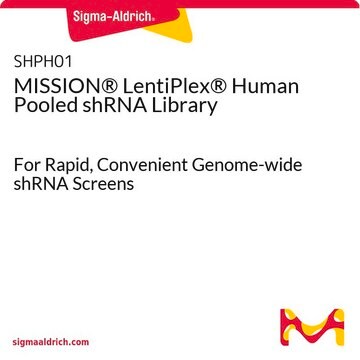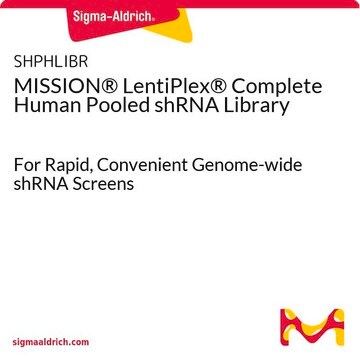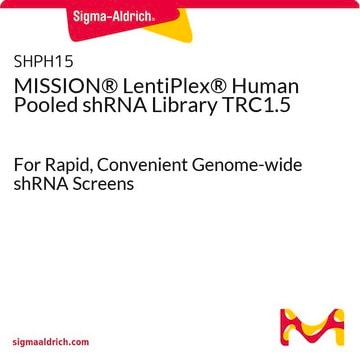Fontos dokumentumok
SHPH2
MISSION® LentiPlex® Human Pooled shRNA Library TRC2
For Rapid, Convenient Genome-wide shRNA Screens
About This Item
Javasolt termékek
Minőségi szint
termékcsalád
MISSION®
koncentráció
≥5x108 VP/ml (via p24 assay)
technika/technikák
capture ELISA: 5 x 108 TU/mL using p24
kiszállítva
dry ice
tárolási hőmérséklet
−70°C
Általános leírás
The MISSION LentiPlex Human shRNA Pooled Library 2.0 includes additional gene and clone coverage from the previously offered LentiPlex 1.0 Pooled Library . With the addition of 2.0, which consists of 5,000+ human genes and 20,000+ total clone coverage divided into 3 subpools, the complete whole-genome human library complete whole-genome human librarynow consists of over 125,000 shRNA constructs from the TRC collection targeting 20,000+ human genes. Each library is tested for shRNA representation before product release to ensure robust library coverage. The complete library is provided in ready-to-use lentiviral format at titers of at least 5 x 108 TU/ml via p24 assay and is pre-divided into sixteen subpools of approximately 6,000-8,000 shRNA constructs each. Amplification and sequencing primers are also provided for downstream target identification.
For more information including sample data and uses, please visit our LentiPlex Technical Detail Page.
Egyéb megjegyzések
Amplification and sequencing primers are also provided for downstream hit identification.
Deconvolution of shRNA Pools
Sigma′s deconvolution service lets you easily identify the genes that impact your pooled shRNA screen.
- Next-generation sequencing of clonesgives a precise number of individual clone occurrence within a pooled shRNA sample
- Comprehensive, reproducible results from pooled shRNA screens
- Statistically robust and information-rich data
Contact your local Sigma sales representative for more information or submit an inquiry to MISSION RNAi
Javasolt termékek
Jogi információk
Tárolási osztály kódja
12 - Non Combustible Liquids
WGK
WGK 3
Lobbanási pont (F)
Not applicable
Lobbanási pont (C)
Not applicable
Válasszon a legfrissebb verziók közül:
Analitikai tanúsítványok (COA)
Sajnos jelenleg COA nem áll rendelkezésre ehhez a termékhez online.
Ha segítségre van szüksége, lépjen velünk kapcsolatba Vevőszolgálat
Már rendelkezik ezzel a termékkel?
Az Ön által nemrégiben megvásárolt termékekre vonatkozó dokumentumokat a Dokumentumtárban találja.
Cikkek
RNAi Consortium (TRC): Collaborative effort among academic labs and biotech/pharma institutes advancing RNA interference research.
Related Content
High-throughput reagents for drug target screening and immunogenicity testing.
Tudóscsoportunk valamennyi kutatási területen rendelkezik tapasztalattal, beleértve az élettudományt, az anyagtudományt, a kémiai szintézist, a kromatográfiát, az analitikát és még sok más területet.
Lépjen kapcsolatba a szaktanácsadással








